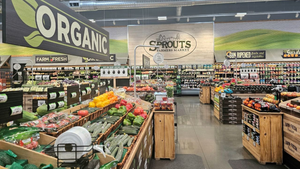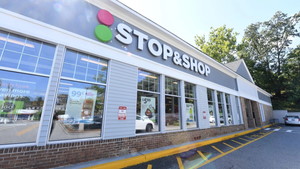Unions: Kroger, Albertsons divestiture list release ‘changes nothing’Unions: Kroger, Albertsons divestiture list release ‘changes nothing’
UFCW argues that C&S Wholesale Grocers unprepared to buy 579 stores in divestiture plan

The decision by Kroger and Albertsons to release the detailed list of 579 stores that would be sold to C&S Wholesale Grocers if the grocers succeed in their proposed merger “changes nothing,” according to Kathy Finn, President of UFCW 770.
Finn and union leaders from locals 7, 324, 400, 770, and 3000 held a press conference Thursday to voice their opposition to the $24.6 billion Kroger, Albertsons merger.
“Yesterday, you may have heard that Kroger and Albertsons released a list of 579 stores across the nation that they are proposing to divest to C&S Wholesale Grocers if the merger is allowed to proceed. Making this list public changes nothing,” Finn said. “The merger is not a done deal, and this coalition continues to do everything we can to stop it.”
John Marshall, a financial analyst for UFCW 3000 and 324, said that although Kroger and Albertsons have argued that the merger is necessary to take on larger competitors like Walmart and Amazon, Kroger and Albertsons still dominate local markets in areas like Southern California.
“This has very significant implications for consumer markets and for labor markets,” Marshall said. “When the number one and number two players in this grocery sector are allowed to combine, they will have huge power to raise prices, close stores, and in negotiations, lower wages and benefits in our negotiations.”
He noted that unions derive part of their leverage on wages and other worker benefits from the ability to play grocers against one another during labor negotiations. “Albertsons knows if they refuse to agree to something that Kroger has agreed to, we'll be able to put up picket lines around their stores and send people nearby to competing union grocery stores, and the same is true for Kroger,” he said.
Marshall questioned C&S Wholesale Grocer’s ability to operate 579 stores — it currently operates largely as a wholesaler and runs 23 stores and one pharmacy. “There are significant challenges operating in the retail pharmacy business currently,” he said. “This specific concern is why the Oregon Health Authorities Community Review Board recently opposed this merger for fear of consumer access to necessary pharmaceuticals.”
Albertsons recently revealed in an internal memo that it plans to move its COO, Susan Morris, to C&S if the deal is approved, possibly in an effort to show federal regulators that it aims to bolster the business if the merger goes through.
He argued that C&S is a weak choice for divestment, particularly because the grocer “has been losing customers between 2017 and 2023, noting a 21.5% decline in sales during that period.
“On an inflation-adjusted volume basis, the decline has been greater than 40%, a significant loss of business for C&S Wholesale Grocers,” he said. “Today, they are in the process of attempting to regain outlets for their wholesale volume by becoming a retail operator.”
That’s been unsuccessfully attempted by other wholesale operations like Supervalu, which was purchased by UNFI in 2018.
Marshall added that credit rating agencies and the stock market also have a poor outlook for C&S, noting that Moody’s gave the wholesaler a Ba3 rating, which is a non-investment-grade speculative rating below investment-grade junk status. The rating agency cited “declining sales, concentrated customer base in margins, high fixed cost, and declining credit metrics as the basis for this low credit quality,” according to Marshall.
He said the buyout price for shareholders, if the merger is successful, is $27.25 per share. “There is a 40.9% upside potential today for investors in this stock in a very short period of time,” he said. “If this merger is approved, it's going to happen in the next three or four months. That would be a huge return. What the stock market is telling us is they don't believe this merger is going to be approved.”
The union effort and recent announcements from Kroger and Albertsons come just weeks before the Federal Trade Commission begins hearings on the proposal on July 31. The FTC and attorneys general from eight states and the District of Columbia filed a joint lawsuit in February to block the deal.
Meanwhile, separate lawsuits from attorneys general in Colorado and Washington state, two of the states that would be most affected by the merger, begin on Aug. 12 and Sept. 16, respectively.
The expiration date, according to the merger agreement, is Oct. 9.
“I think it's going to be very difficult if we get negative rulings or the merger in any of these cases for the company to be able to appeal it within the timeframe established in the merger agreement.
“We look forward to getting this merger proposal behind us and having these two companies continue to operate as standalone companies instead of taking billions of dollars out of the operations of these stores and giving them to shareholders,” he said. “Those dollars should be reinvested in the stores to lower prices, better staffing, higher quality facilities; that's what customers want. That's what workers want.”
In June, Kroger Chairman and CEO Rodney McMullen reiterated the company’s promise to invest $500 million to lower prices and $1.3 billion to upgrade Albertsons stores if the merger is approved. Kroger also said the merger would not result in layoffs.
“Employees will benefit from Kroger’s commitment to invest $1 billion to raise wages and comprehensive benefits, further building on our $2.4 billion in incremental investments since 2018,” McMullen said in a Q1 earnings call in June. “As union membership continues to decline nationwide, this merger will secure union jobs. And communities will benefit from the strength and the ability of the combined company to accelerate Kroger’s commitment to ending hunger.”
About the Author
You May Also Like






